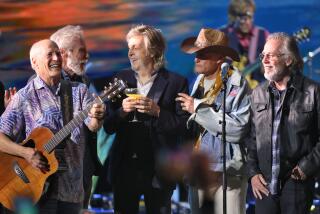A Musical Farewell to the Life of the Party
- Share via
A crowd of his loyal admirers and fellow musicians gathered in a Los Angeles hotel ballroom Sunday afternoon to say goodby to the cornetist Wild Bill Davison, who did not like to be called legendary but was.
The word legendary made him sound ancient, he complained. In fact, he would have been 84 in January, had been playing professionally for nigh on 70 years and, up to the moment he went into the hospital, was planning to celebrate the birthday during a grand gig in a fancy hotel in Switzerland, leading an all-star group of his favorite musicians.
Some of them were on the stand Sunday afternoon, remembering Bill and playing some of the good oldies that he had played so often: “Exactly Like You,” “Lady, Be Good,” “After You’ve Gone,” “Memories of You.” (A few of the titles acquired an additional weight in the circumstances.)
Chuck Hedges, the clarinet man who often toured with Bill, flew in from Milwaukee. Tommy Saunders, the cornetist whose hard-driving but lyrical style is remarkably like Davison’s, had come in from Detroit soon after Bill fell ill. Saunders played in the hospital room when it was thought that music might penetrate the final coma into which Davison had fallen.
Pianist Johnny Varro, drummer Gene Estes, tenor sax man Dick Hafer, trumpeter Dick Cathcart, bassist Ira Westley and other players sat in.
At Wild Bill’s funeral in a Santa Barbara church Saturday, Saunders and a group played “A Closer Walk With Thee,” the lovely old hymn so often played as a dirge en route to funerals in New Orleans, then taken as an uptempo march on the way back to town.
“Bill used to call me his illegitimate adopted son,” Saunders told the crowd Sunday afternoon, and there is a remarkable but entirely coincidental physical resemblance.
Davison was at that probably better identified as an uncle-figure than a father-figure: the free-spirited uncle who is always popping in unexpectedly, enchanting the youngsters with his tales of naughtiness in the larger world and distressing the staid elders.
Even when his doctors and his steadfast wife Ann persuaded Davison to give up strong drink seven years ago, he managed to remain the life of the party anyway.
When he played, as he often did in his later years, at jazz festivals and in concert, Davison still managed to suggest he was in every speak-easy, roadhouse, saloon, smoke-filled basement boite or pocket-picking nightclub that ever was.
The various perfumes of cigarettes, whiskey and wild, wild women seemed to cling to him (although the last of his several marriages was happy, productive and enduring). He seemed to carry his past, and a vivid slice of our national past, with him; it helped give him a unique appeal.
It was quite a past. Jazz historian Fred Hall played excerpts Sunday afternoon from a long taped interview with Davison. Wild Bill remembered tootling around, improvising duets with another very young Midwesterner named Bix Beiderbecke, Davison in those days playing mellophone, a sort of poor man’s French horn.
In particular Davison remembered a very early gig when he and his group were playing at one end of a large ballroom, Beiderbecke and the Wolverines at the other. Horn players generally used mutes in those days, but Davison heard the sweet, unmuted sound of Bix’s trumpet from the other end of the hall and said, “I never used a mute again.”
The cornet, its tone darker and rounder than the trumpet’s, had its advocates, even after the trumpet became the standard in bands. Rex Stewart, Muggsy Spanier and Bobby Hackett stayed loyal to the cornet and so did Wild Bill, although he could outgun every trumpet on the block.
A writer once spoke of Davison’s “raucous, damn-the-torpedoes style.” It was accurate. The saints did not just go marching in, they laid waste to everything in their path. In truth, Davison was not a Dixieland musician and grew as tired as most musicians do of “The Saints,” “Muskrat Ramble” and the other Dixie standards.
He was of the later musical strain that headed east from the Midwest rather than north from New Orleans. It still wasn’t polite jazz; it kept its hat on in the house, so to speak.
In Wild Bill Davison’s playing, early and late, there was a kind of lyrical rascality, a verve and joyousness that was uniquely his own. He developed a low-register growl that was part of his trademark, the musical equivalent of an innocently wicked wink.
A large handful of Davison’s contemporaries are, quite astonishingly, still at it: Bud Freeman, Yank Lawson, Bob Haggart, Milt Hinton and others. It is not yet time to declare the end of an era. But one of the era’s brightest lights, a man whose style was as personal as he was personable, has left the scene.
The sense of the gathering Sunday afternoon was that both the players and the hearers had lost not a legend but a close pal.
More to Read
The biggest entertainment stories
Get our big stories about Hollywood, film, television, music, arts, culture and more right in your inbox as soon as they publish.
You may occasionally receive promotional content from the Los Angeles Times.










